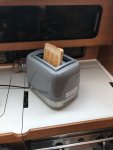lustyd
Well-Known Member
Your post literally read like a list of excuses and I responded to that. If it's a truly suitable replacement then I shouldn't need to move to the med, spend £10k on upgrades with all the ecological damage that hardware entails, be careful with the weather and when I plug in etc. It should be as easy and flexible as the perfectly adequate gas system being replaced which has only one problem of availability in certain areas and certain suppliers.@Kelpie as hit the nail on the head . Nothing going to convince you and most of us who are happy with electric couldn't give a monkeys one way or the other what you think , it just a shame your posting could put people off from trying .
By the way We been living on our hook for the last 13 years for 9 at times 10 months every years,
Not a couple of nights as you keep suggest.

